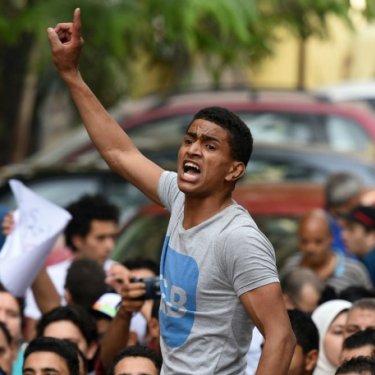RSF condemns arrests of dozens of reporters while covering protests

Reporters Without Borders (RSF) is appalled to learn that dozens of foreign and Egyptian journalists were arrested while covering major protests against President Abdel Fattah el-Sisi’s government in various parts of Cairo and in provincial cities yesterday.
The large numbers of police deployed for the occasion quickly dispersed the protests and arrested hundreds of demonstrators, taking them and the detained journalists to police stations.
The demonstrations were called in part to protest against the economic situation and human rights violations. But the main target was the government’s unpopular decision to cede two small but supposedly strategic Red Sea islands, Tiran and Sanafir, to Saudi Arabia. The protests also coincided with a national holiday marking the anniversary of Israel’s restoration of the Sinai Peninsula to Egypt in 1982.
“We condemn this wave of arrests of journalists who were trying to cover national protests,” said Alexandra El Khazen, the head of RSF’s Middle East desk. “The government clearly does not distinguish between journalists and demonstrators, and targeted the media in order to remove unwanted observers. We call on the authorities to end police violence against journalists and to ensure that those responsible for the attacks and abuses are brought to justice.”
Noha Abdel Wahab, who heads the monitoring and documentation unit at the Journalists Against Torture Observatory (JATO), told RSF that around 30 to 40 journalists were either briefly detained or arrested in connection with their reporting yesterday in Cairo and Gizeh (20 km southwest of central Cairo).
She said that about 15 journalists were released yesterday evening or this morning and that JATO was trying to get information about the 10 journalists still held. Journalists of French, Norwegian and Danish nationality were among those arrested while covering the protests.
A Cairo media source said that the police, who had prepared for three days prior to the demonstrations, quickly cordoned off the various assembly points and even raided cafés and other public places in order to arrest government opponents and human rights activists.
Foreign journalists were arrested in Mesaha Square, in the Cairo district of Dokki, and, although they identified themselves as media personnel, they were taken to a nearby police station by uniformed and plainclothes police and members of the Special Forces, who confiscated electronic equipment.
“We knew that we were being targeted as journalists,” the same source said.
When a BBC cameraman filmed a pro-Sisi demonstration in the Cairo district of Nahya yesterday morning, he was physically attacked by Sisi supporters while police looked on without intervening.
Yesterday’s protests came ten days after a previous demonstration by thousands of people in protest against the cession of the two islands, which was announced during a visit to Cairo by Saudi Arabia’s King Salman earlier in April.
Ranked 159th out of 180 countries in RSF’s 2016 World Press Freedom Index, Egypt is the world’s fourth biggest prison for journalists, after China, Eritrea and Iran.



